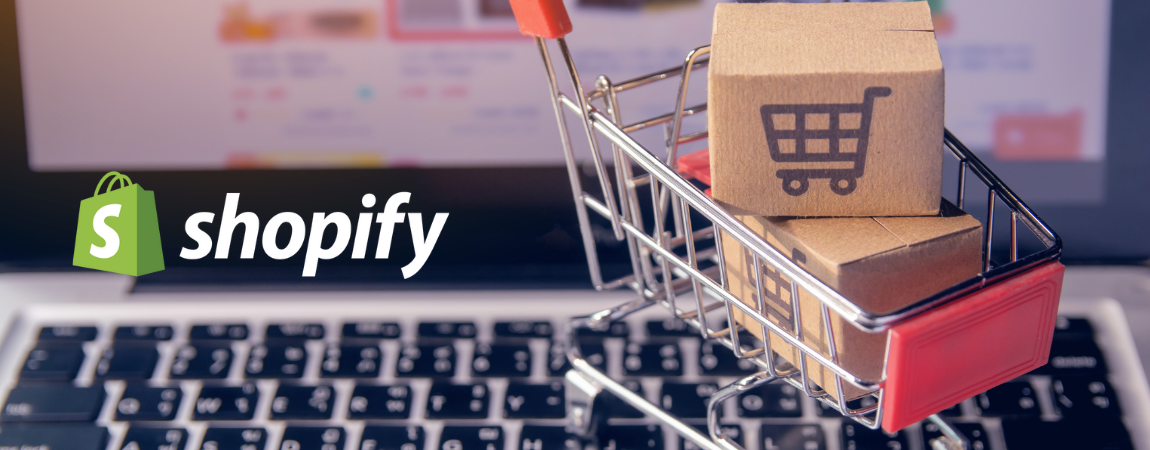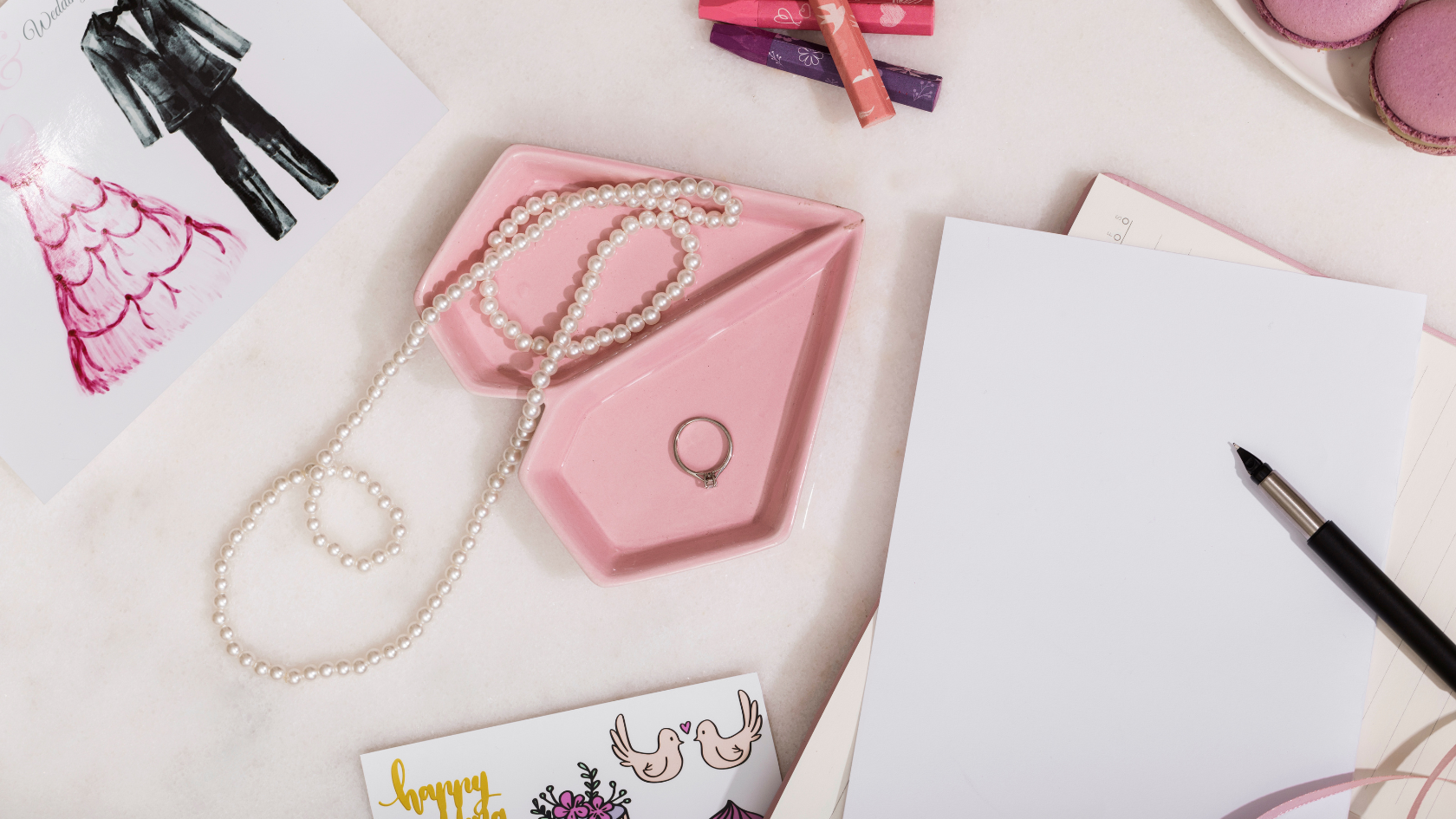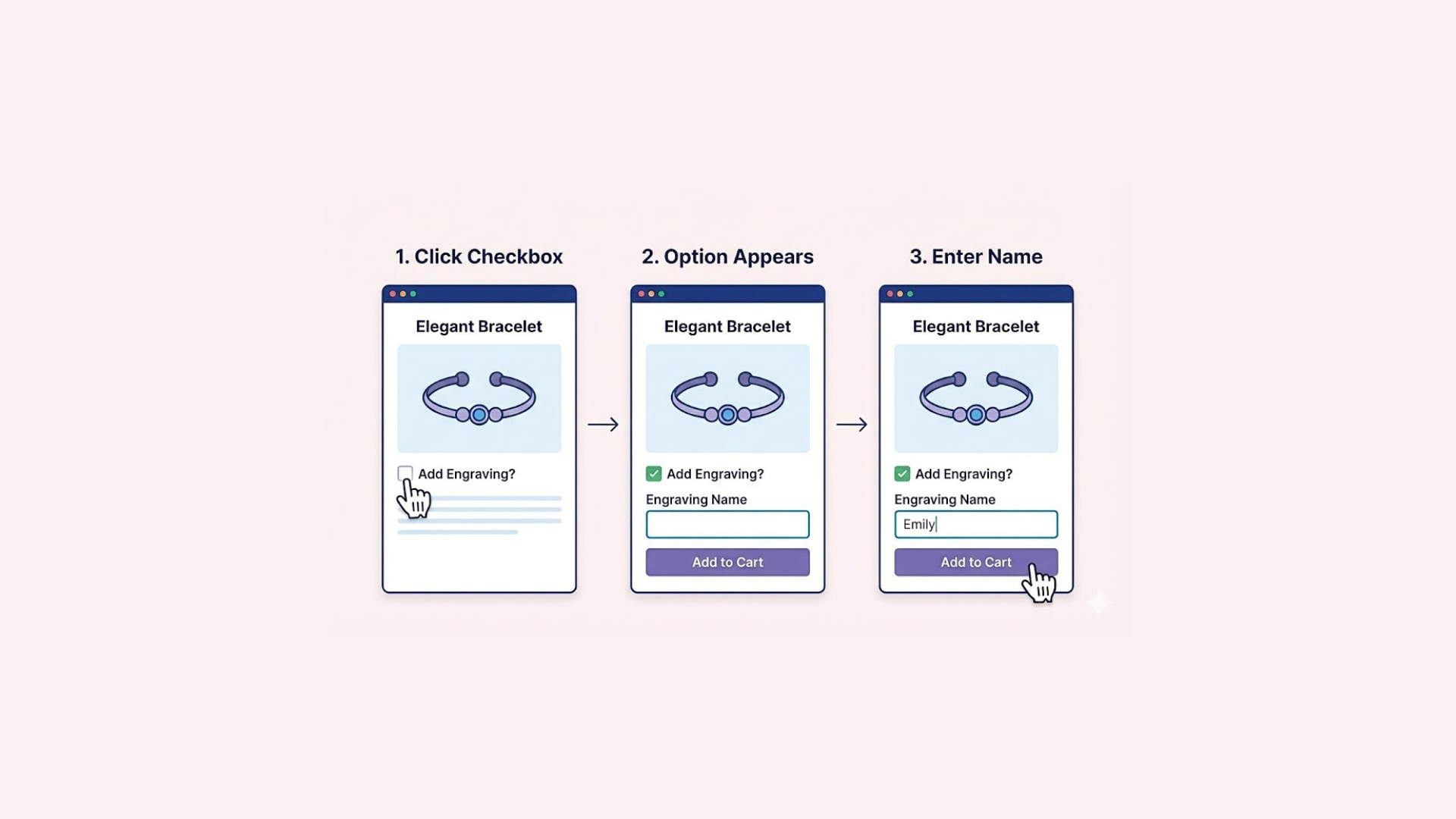Product personalization is no longer just a “nice-to-have” feature—it’s something customers actively look for when shopping online. Whether it’s adding a name to a necklace, customizing the color of a phone case, or choosing add-ons for a main product, shoppers want the ability to make products their own.
This growing demand has led many Shopify store owners to wonder: Does Shopify have a product configurator built in? And if not, what’s the easiest way to add one?
In this article, we’ll break down what Shopify offers out of the box, the different types of product configurators available, and how you can quickly set up simple yet powerful customization options
Key Takeaways
- Shopify does not have a built-in product configurator beyond its basic variant options (size, color, material).
- Merchants can choose from different types of configurators, ranging from simple text and image personalization to advanced 3D and AR solutions.
- For most stores, simple to advanced 2D configurators are sufficient to offer popular features like live preview, conditional logic, and price add-ons.
- Easify Product Options provides an easy way to add powerful customization features to Shopify stores without the complexity of 3D tools.
What Shopify Offers Out-of-the-Box
Shopify is a powerful e-commerce platform that makes it easy to sell almost anything online. Out of the box, it provides a basic way to offer product variations—like size, color, or material—using its variant options feature. For example, you can create a T-shirt product with different sizes (S, M, L) and colors (red, blue, black) directly in Shopify.
However, this built-in system has some important limitations when it comes to product customization:
- Limited number of options: Shopify only allows up to 3 option types per product (e.g., Size, Color, Material) and a maximum of 100 variant combinations.
- No personalization fields: You can’t add custom text fields, file uploads, or image uploads natively. So, customers can’t easily add things like engraved messages or custom images.
- No real-time preview: Customers can’t see a live preview of their customizations—what they choose is only communicated at checkout, leading to back-and-forth communication.
- No conditional logic: Every option shows at once; you can’t hide or display options dynamically based on previous selections.
In short, while Shopify’s built-in tools work fine for simple product variations, they fall short when it comes to personalization or more complex product configurations.
Types of Product Configurators for Shopify Stores
Product configurators on Shopify come in different forms depending on the level of customization a store needs. Here are the main types:
1. Simple Product Configurators
These handle basic personalization tasks and are ideal for small to medium-sized stores. Common features include:
- Text Input Fields: For engraving names or adding messages.
- Image/File Upload: Allow customers to submit their own designs or photos.
- Dropdowns, Checkboxes, and Radio Buttons: Useful for selecting product options like color, size, or style.
- Conditional Logic: Show or hide options based on customer choices.
- Price Add-ons: Charge extra for certain customizations or premium materials.
2. Advanced 2D Product Configurators
These configurators let customers visualize their customizations in real-time:
- Live Preview: Updates text or images instantly on the product image.
- Dynamic Image Layers: Change colors, patterns, or elements with immediate feedback.
3. 3D & AR Product Configurators
For industries like furniture, automotive, or luxury goods, some stores adopt 3D models or augmented reality (AR):
- 3D Views: Rotate and zoom in on products from any angle.
- AR Integration: Place virtual products in real-world environments using a smartphone camera.
These solutions are usually more complex and require specialized tools or custom development.
Most Shopify merchants find that simple or advanced 2D configurators cover the majority of customization needs, such as personalized gifts, apparel, or accessories. For these scenarios, apps like Easify Product Options provide a practical and easy-to-use solution, which we’ll explore in the next section.
Easify Product Options: Simple Yet Powerful Customization for Shopify
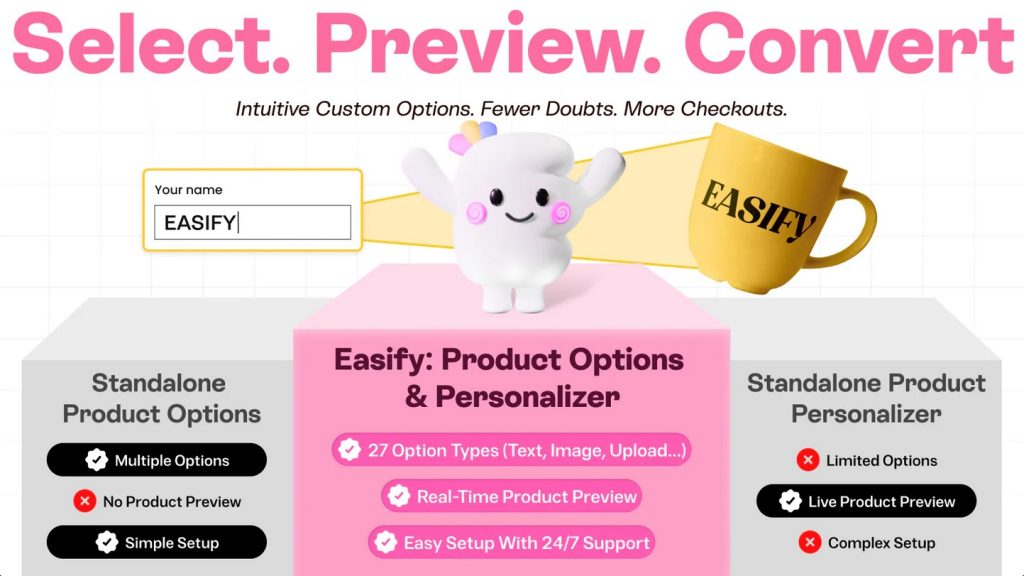
For store owners looking to go beyond Shopify’s basic variant options without diving into complex or expensive 3D/AR solutions, Easify Product Options offers a practical and user-friendly way to add customization features to your store.
With Easify, you can:
- Add Unlimited Custom Options – Text boxes, dropdowns, checkboxes, radio buttons, image and color swatches, file uploads, and more.
- Enable Conditional Logic – Show or hide options dynamically based on customers’ previous selections for a cleaner, more intuitive experience.
- Use Price & Product Add-ons – Charge extra for premium materials, gift wrapping, or other add-ons to increase your average order value.
- Offer Real-Time Live Preview – Let customers instantly see their custom text, images, or uploads on the product before checkout, reducing errors and returns.
- Support Advanced Fields – Include date/time pickers, custom dimensions, color and font selectors, and more for a tailored shopping experience.
Whether it’s engraving jewelry, personalizing gifts, or offering custom apparel, Easify Product Options helps you create the personalization experience your customers want—without the complexity of full 3D or AR tools.
In the next section, we’ll explore some real-world examples of how stores can use Easify Product Options to boost sales and delight customers.
Real-World Use Cases for Easify Product Options
To give you a better idea of how product configurators can enhance the shopping experience, here are some real-world scenarios (based on our demos) where Easify Product Options helps bring customization to life:
1. Jewelry Engraving with Live Preview
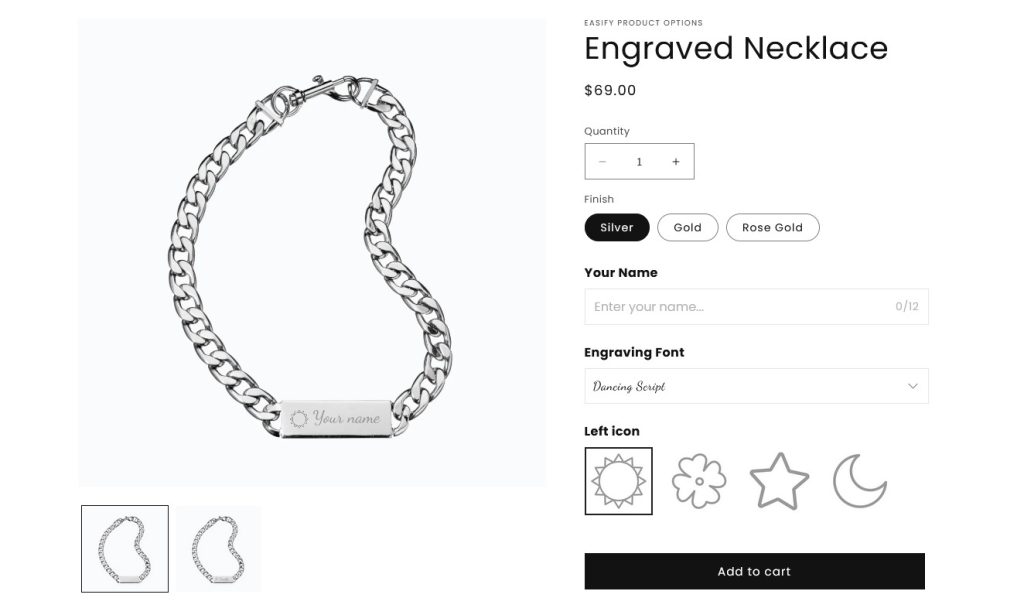
Customers buying jewelry often want to add a personal touch—like initials, names, or special dates. With a live preview feature, they can see exactly how their text will look on the product before placing the order. This not only improves customer confidence but also reduces the risk of errors and returns.
2. Added Option Price on Main Product
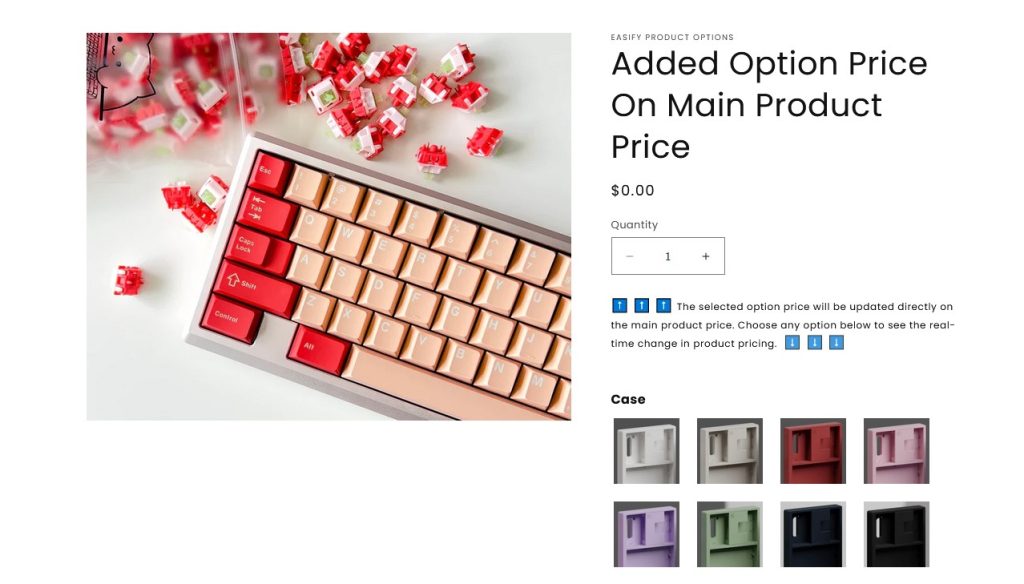
The main product here was a mechanical keyboard, and customers could choose add-ons like a premium case, a custom badge, or other accessories. The configurator automatically updated the total price based on the selected options, making upselling seamless and transparent.
3. Custom Measurements with Price Calculation
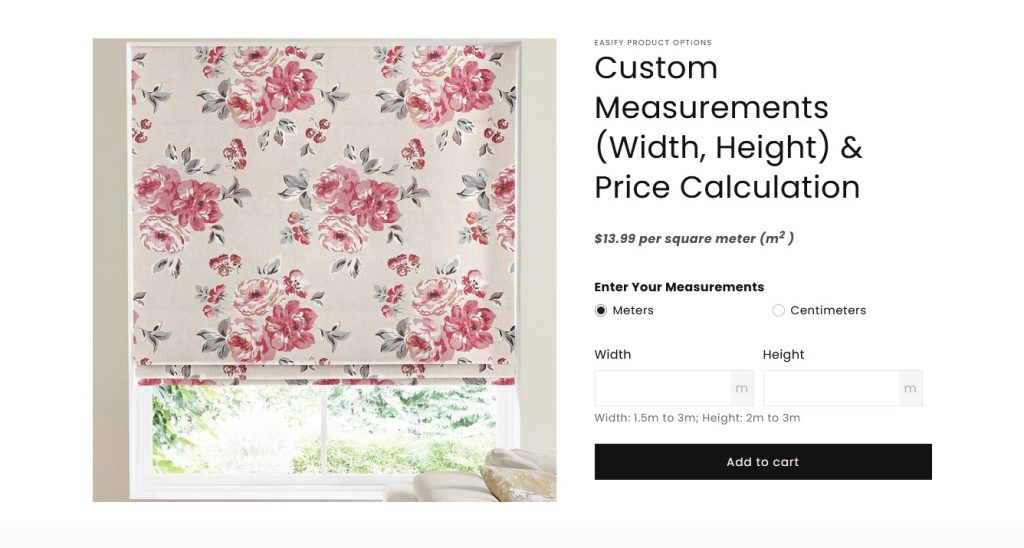
For products like curtains, customers can input their desired width and height directly on the product page. The system then calculates the price dynamically based on the measurements provided. This saves time, avoids back-and-forth communication, and ensures accurate orders every time.
These examples show how product configurators—like Easify Product Options—can fit into different industries and product types, making customization simple, efficient, and customer-friendly.
Final Thoughts
While Shopify provides basic product variant options, it doesn’t offer a full-fledged product configurator out of the box. For most merchants, especially those selling customizable products like jewelry, apparel, or home goods, adding a product configurator can significantly improve the customer experience and increase sales.
If your store needs simple yet powerful customization tools—like text input, image uploads, conditional logic, and real-time previews—without the complexity of 3D or AR solutions, Easify Product Options is a practical choice. It bridges the gap between Shopify’s limited native features and the advanced functionality many stores need to offer personalization at scale.
Ready to make your products truly yours? Try Easify Product Options today and see how easy it is to add customization features your customers will love.
